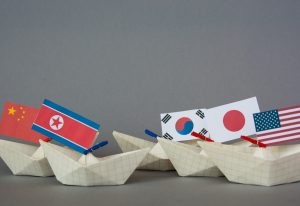Kim Gunn, the South Korean special representative for Korean Peninsula peace and security affairs, met his U.S. and Japanese counterparts – Sung Kim and Funakoshi Takehiro – on Tuesday in Jakarta, Indonesia. The talks came three months after their last meeting in Tokyo, Japan.
The representatives discussed North Korea’s recent actions, including its missile launches, and reaffirmed their joint commitment on the issue during the meeting.
“The international community has firmly pursued a denuclearization of North Korea as a common goal for the past 30 years and will not reconsider it in a million years,” Seoul’s special representative Kim said. He also stressed that the international community will not recognize the North as a nuclear state, adding that Pyongyang would need to face reality if it has even a little hope for that outcome.
Pointing out the North’s devastated economy due to natural disasters and its drastic anti-pandemic measures, Kim also underlined that by testing nuclear and missile programs, Pyongyang wasted scarce resources that could have been helpful for the livelihood of the North Koreans.
Despite the inter-Korean dialogue being stalled, Kim emphasized that the Yoon Suk-yeol administration’s “audacious initiative” shows Seoul’s genuine will to negotiate with the North, adding that the door for dialogue is still open. However, since Kim Yo Jong, the powerful sister of the North Korean leader Kim Jong Un, harshly belittled and downplayed Yoon’s plan days after the South Korean president proposed it in August, it is questionable how Seoul could entice Pyongyang to return to the negotiating table while the tensions on the Korean Peninsula escalate. Since Yoon took office, Seoul has not actively engaged in dialogue with Pyongyang due to its firm stance on strengthening military alliance with the United States.
The U.S. special representative for North Korea, Ambassador Sung Kim, also said that the threats posed by the North are not just a concern for the United States and the East Asia region. He urged the international community to raise a united voice to tackle the issue successfully.
China and Russia, both permanent members of the U.N. Security Council, have not been supportive of the U.S.-led attempt to punish North Korea for its flurry of missile launches, including intercontinental ballistic missiles, this year.
During the talks, the representatives from South Korea, the U.S., and Japan “also reviewed the synchronized trilateral release of sanctions targeting the DPRK in early December and emphasized the need to use all available tools to further limit the growth of the DPRK’s destabilizing ballistic missile and nuclear weapons programs,” Ned Price, the U.S. State Department spokesperson, said in his press briefing on Tuesday. (DPRK is the acronym of North Korea’s official name: Democratic People’s Republic of Korea.)
Since the failed Hanoi summit between then-U.S. President Donald Trump and Kim Jong Un in 2019, Pyongyang has made clear that it will only consider renewing dialogue with Washington if the United States makes concessions first. The concessions refer to lifting devastating economic sanctions and halting the South Korea-U.S. joint military exercises.
Although Seoul and Washington have repeatedly emphasized that the door for dialogue is open, they have simultaneously scaled up joint military drills involving the U.S. powerful strategic assets and vowed to use all possible options to deter the North’s missile threats. North Korea cannot tolerate such a two-pronged approach and has responded with a sharp escalation in missile launches and artillery fire.

































